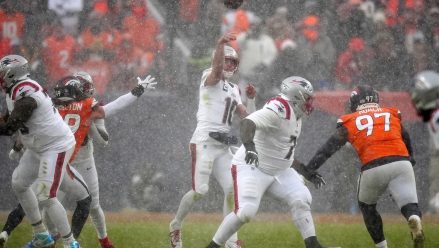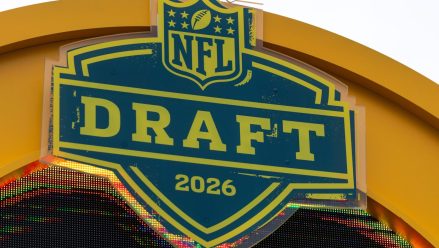Observers of Kalshi-versus-state lawsuits had, until last week, seen three cases that followed a familiar pattern — even if judges’ rulings weren’t always the same.
A state would issue a cease-and-desist order against Kalshi, ordering it to shut down its sports event contracts, and when it tried to enforce the order, the prediction market would sue in federal court.
But the lawsuit filed Friday by Massachusetts Attorney General Andrea Joy Campbell against Kalshi is a new phase in the battle between states and prediction markets over whether sports event contracts are a legal and federally regulated financial product, or an illegal form of sports betting.
It’s the first time an attorney general has challenged the legality of sports event contracts in a state court. And it appears that one party is already challenging whether Campbell can do so. Kalshi partner Robinhood filed a lawsuit in federal court Monday, asking for an order to prevent the state from enforcing its laws against the trading app. Robinhood — which offers its users access to Kalshi contracts — was not a defendant in the lawsuit brought Friday, but it said “there is a real and imminent threat” it will be the subject of a similar suit.
The case in Massachusetts mostly argues that Kalshi is offering sports bets, and it is not complying with the stringent requirements set out by the Massachusetts Gaming Commission to acquire a state license. Legal betting operators in Massachusetts pay states taxes, which Kalshi does not, and are subject to what are considered the toughest responsible gambling, advertising, and consumer protection regulations in the U.S.
MA-Kalshi-lawsuit-1“Kalshi is facilitating gambling in Massachusetts without all required responsible gambling features mandated for licensed sports wagering operations, and without any oversight by the MGC as to whether its measures are effective, which is exposing residents of the Commonwealth to gambling addiction without few safeguards,” the complaint reads.
AG says Kalshi must get license
Campbell said in a press release that she hoped to see Kalshi obtain a license to operate within the state, and tied Kalshi’s offering to the risk of sports betting addiction.
“Sports wagering comes with significant risk of addiction and financial loss and must be strictly regulated to mitigate public health consequences,” Campbell said. “This lawsuit will ensure that if Kalshi wants to be in the sports gaming business in Massachusetts, they must obtain a license and follow our laws.”
In the same press release, MGC Chair Jordan Maynard also backed the lawsuit.
“Prediction market companies are expanding into sports wagering while neglecting age restrictions, player protection programs, state taxes, and other consumer protections. My fellow commissioners and I appreciate the Attorney General’s efforts to enforce the law and hold these companies accountable to Massachusetts’ rigorous standards,” Maynard said. “We look forward to our continued partnership with Attorney General Campbell and her office.”
While Kalshi’s defense in this case remains to be seen. In federal cases it has typically argued that as an entity registered with the Commodity Futures Trading Commission (CFTC), only the CFTC has jurisdiction to stop it from offering certain types of contracts. It has often added that it cannot get state licenses, as these would prevent it from following the requirement that it offer “impartial access.”
In a statement provided to InGame, a Kalshi spokesperson said Massachusetts was relying on “outdated laws” to try to get its sports contracts shut down.
“Kalshi offers its users a fair, transparent, federally-regulated, and nationwide marketplace,” the statement said. “Rather than engage in dialogue with Kalshi as many other states have done, Massachusetts is trying to block Kalshi’s innovations by relying on outdated laws and ideas.
“Prediction markets are a critical innovation of the 21st century, and all Americans should be able to access them. We are proud to be the company that has pioneered this technology and stand ready to defend it once again in a court of law.”
‘Round Three’ of prediction market lawsuits
Many of these arguments may sound familiar, but elements of this case make it very different to those which have come before.
This time, Kalshi is not suing a state or its authorities. Instead, it’s the Massachusetts attorney general bringing a lawsuit against the prediction market.
“Unlike the Nevada, New Jersey, and Maryland litigation — where Kalshi raced to the courthouse and filed a complaint first — Massachusetts is the plaintiff in this new case, which is a different procedural posture than the other three ongoing lawsuits,” an academic legal source who has been following the prediction market litigation closely but is uninvolved in any of the cases told InGame.
That brings us to another difference. Typically state AGs have used their own authority to issue cease-and-desist letters to Kalshi — the lawsuits against Maryland, Nevada, and New Jersey came when the states tried to enforce those cease-and-desists. But in this case, Campbell is instead asking a judge to “permanently enjoin [Kalshi] from engaging in sports wagering without a license.”
And perhaps most importantly, the case is taking place not in a federal district court, but in the Suffolk County Superior Court, a state-level court.
“The suit is significant, because it marks a new development in the fight over the legality of sports prediction markets,” Andrew Kim a partner at Goodwin Law, told InGame.
“In the first round, we had the cease-and-desist letters. In the second round, you had Kalshi going on offense, filing preemptive declaratory judgment actions against Nevada, New Jersey, and Maryland.
“Now you have round three, which is a state regulator going on offense, seeking to enforce state gaming laws in state court, which may not be as receptive to federal preemption arguments.”
That could be very important. Kalshi’s prior lawsuits have mostly dealt with the question of whether the federal Commodity Exchange Act (CEA) overrides state gambling laws.
Federal judges may be more inclined to believe federal law overrules state law and state courts may see the opposite. Either way, one source told InGame, filing in state court could lead to an “immediate disruption” of Kalshi’s ability to operate in Massachusetts, and slow the legal process.
But if the state court is less likely to be friendly to Kalshi’s arguments, that doesn’t mean Kalshi simply has to deal with it and fight a case in front of a less-favorable judge.
“It is highly unlikely that Kalshi will want to litigate this case in the Commonwealth of Massachusetts, so look for Kalshi to try to get this case removed to federal court soon,” the academic legal source told InGame.
But if there’s a battle over jurisdiction, that brings with it a whole new set of legal arguments for observers to learn about.
Complete preemption
One of those is the doctrine of complete preemption.
Those following Kalshi’s federal cases against Maryland, Nevada, and New Jersey will have heard plenty about preemption – usually either “field preemption” or “conflict preemption.”
In all three federal lawsuits, judges said that the federal CEA most likely “preempts the field” of commodity regulation, meaning that any state law on the topic is overruled by the CEA. In the New Jersey and Nevada cases, the judges went on to say that the field of commodities regulation includes state gambling laws, and granted Kalshi injunctions — the judge in the Maryland case disagreed, arguing the field in question was more limited.
Kalshi has also argued about conflict preemption, which is when it is impossible to comply simultaneously with federal and state law. The prediction market says that it can’t simultaneously comply with state gambling laws and the federal requirement to provide “impartial access” to its markets.
But complete preemption requires a higher standard. It applies when Congress has specifically set out a cause of action — that is, a system where parties can sue in federal court for violations of the law. It must also have intended this cause of action to be the only way to sue for breaches of the law in question.
Labor law cases concerning collectively bargained agreements are a common type of case where complete preemption usually applies. If a union tries to sue an employer over state breach-of-contract laws, the case would typically be redirected to a federal court because the Labor Management Relations Act sets out a process to sue for breaches of collectively bargained labor agreements.
The CEA does offer an exclusive cause of action for at least some violations of the law. It says, “the United States district courts shall have exclusive jurisdiction,” for actions brought under Section 25 of the Act.
However, this section deals with specific offenses such as fraud or manipulation of contracts, not about an exchange offering contracts that may violate state law.
The law also gives the CFTC “exclusive jurisdiction” over accounts, agreements, and transactions involving contracts, but this portion of the law doesn’t mention how private parties might seek recourse, as would be typical in a cause of action.
In a 1987 case concerning the CFTC, the Seventh Circuit said “Congress intended to preempt some, but not all, state laws that bear upon the various aspects of commodity futures trading,” when it passed the CEA, suggesting that it did not believe state law was completely preempted.
The Grable doctrine
Another principle that may be relevant is the Grable doctrine. That doctrine applies when a case might otherwise be heard in state court, but hinges on interpretation of an important federal rule.
In the original Grable case, Grable & Sons Metal Products sued Darue Engineering in a property-ownership dispute. But the dispute ultimately revolved around whether the IRS was right to seize the property in question from Grable for unpaid taxes and sell it to Darue.
For Grable to be relevant, the federal issue must be something that the two parties disagree on, and it must be an issue that is not just relevant for the purposes of the case itself.
The question of whether federal law preempts state law when it comes to a specific subject is not typically enough of a federal question for Grable to apply.
However, the question of whether sports event contracts are swaps – a type of financial product typically used for hedging risk, which must be linked to “potential financial or economic consequences” – may make Grable relevant. In this case, the question concerns interpretation of the CEA, rather than debate over when it overrules state law.
On social media site X, Kim noted that the “test” for whether Grable should apply is not always clear, and this lack of clarity may offer Kalshi a way to argue the case should be heard by a federal judge.
AG makes case state court has jurisdiction
The state, in its complaint, attempts to make clear that this is a state issue rather than a federal one. It starts its complaint by noting that gambling has long been seen as a matter controlled by states, rather than federal government.
It also aims to directly tie Kalshi’s offering of sports betting without following the requirements that would be expected of an operator licensed in the state to possible harms that could be suffered by Massachusetts residents.
“This court has specific personal jurisdiction over Kalshi under G.L. c. 223A, § 3 [the state law determining jurisdiction], because, among other things, Kalshi engaged in and continued to engage in business within Massachusetts by offering wagers to Massachusetts consumers on the likelihood of a sports-related occurrence, and because Kalshi’s actions and inactions have harmed Massachusetts residents,” the complaint says.
It notes examples of Kalshi’s marketing, such as a trading volume leaderboard and a “ticker tape” of market activity, in order to argue Kalshi encourages “high-risk behavior.”
“The AG is counting on the likelihood that the state court, over the federal court, will be receptive to her urgent public health concerns that Kalshi’s product is in fact a form of illegal sports betting with an addictive quality and is offered in Massachusetts without key responsible gaming tools and guardrails on advertising, required of the Commonwealth’s regulated sports betting market,” an industry source told InGame. “Kalshi’s own marketing certainly seems to support her arguments.”
Sleeper accuses CFTC of unlawful actions
In other legal developments for sports event contracts, fantasy app Sleeper Friday wrote to the Office of Inspector General – the organization that oversees other federal bodies – accusing the CFTC of breaking the law by “refusing to approve” its application to become a futures commission merchant (FCM).
An FCM allows its customers to access contracts that are traded by a CFTC-registered designated contract market (DCM). It is how Robinhood offers access to Kalshi’s contracts, and how FanDuel plans to offer access to contracts made by commodities giant CME. It is not clear which DCM Sleeper intends to partner with.
The law firm Milbank, acting on behalf of Sleeper, accuses the CFTC of “abuse, mismanagement, and waste.” It goes on to claim that “this illegal delay has been undertaken at the direction, or at least with the full knowledge, of the CFTC’s acting chair and sole commissioner.” This is Caroline Pham.
The letter was published by Milbank partner Josh Sterling via LinkedIn on Monday.
Lawyers at Milbank have also represented Kalshi in its lawsuits against Maryland, Nevada, and New Jersey.
Sleeper has an active application with the National Futures Association (NFA), a key prerequisite to becoming an FCM. The letter claims that the NFA was “prepared to approve” Sleeper’s application in August, but “CFTC staff instructed” the NFA staff not to do so.
It goes on to allege that the CFTC’s reasons for doing so were “unspecified concerns by the Commission about certain event contracts that are or will be listed on a designated contract market that is unaffiliated with Sleeper.”
DraftKings, Underdog, and PrizePicks are among the other fantasy operators or sportsbooks with active NFA applications. None have been approved so far.







